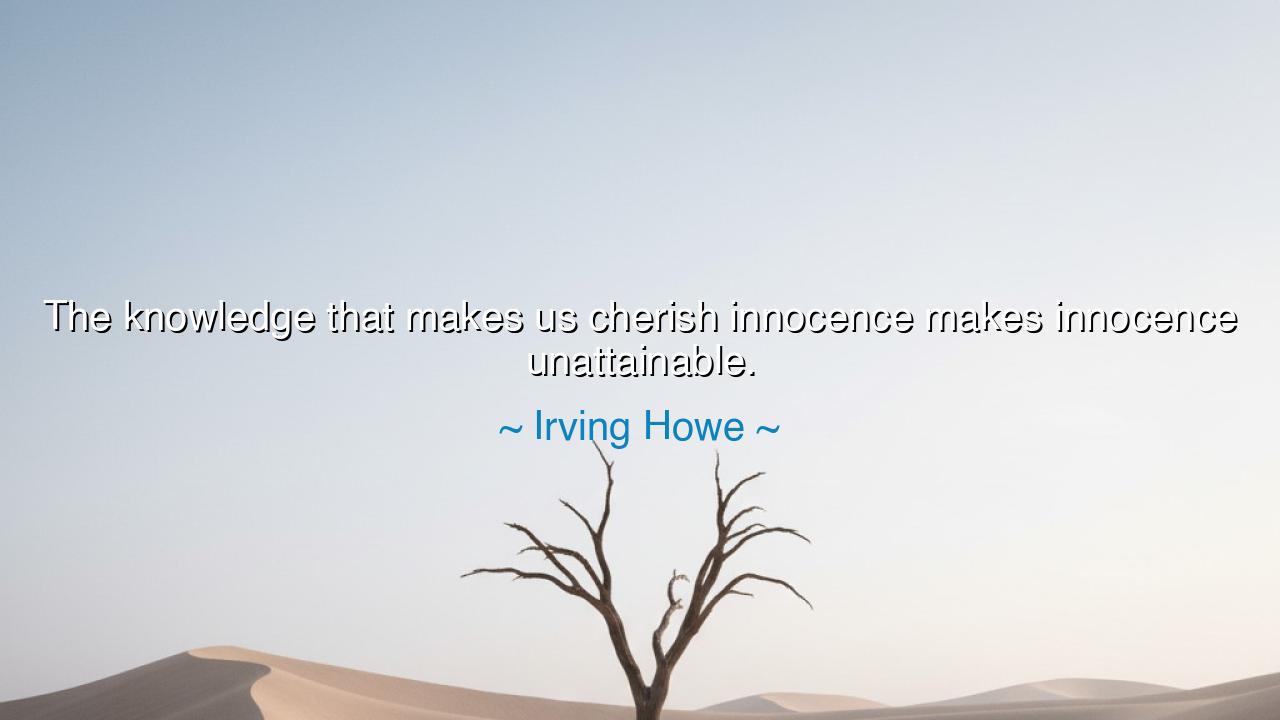
The knowledge that makes us cherish innocence makes innocence






“The knowledge that makes us cherish innocence makes innocence unattainable.” – Irving Howe
In these haunting and paradoxical words, Irving Howe, the American literary critic and political thinker, captures one of the deepest truths of the human condition: that knowledge, which enlightens and awakens us, also carries the power to destroy the very purity we come to admire. It is the eternal irony of growth—that the more we understand life, the more we lose the simplicity with which we once beheld it. Howe’s reflection is not an argument against wisdom, but a lament for the fragile beauty of innocence, that state of unguarded trust which dies the moment we learn why it is precious. His words echo through the ages like the soft toll of a bell at dusk—a sound that both honors what is lost and reminds us of what it means to be human.
The meaning of this quote unfolds like a tragic revelation: innocence and knowledge cannot coexist. When we gain the awareness that allows us to value purity, that very awareness renders us incapable of possessing it. The child who first learns what evil is can never again look upon the world with unshadowed wonder. The lover who has known betrayal cannot return to the unthinking joy of first devotion. And the society that has endured corruption cannot again believe in untested virtue. Thus, Howe’s words are not only about youth or naivety—they are about the irreversible nature of consciousness. Once the mind awakens, it cannot return to sleep; once the heart sees truth, it cannot unsee it.
The origin of Howe’s insight lies in his lifelong engagement with politics, morality, and literature. Writing in the aftermath of the great upheavals of the 20th century—the wars, the totalitarian regimes, the moral compromises of ideology—he witnessed how ideals, once pure, became tainted by the very awareness that sought to protect them. He saw that those who had seen the depths of human cruelty could no longer believe in innocence untested by fire. Yet, paradoxically, it is that very knowledge of corruption that makes them yearn for innocence again. Howe understood what philosophers from Socrates to Nietzsche had long wrestled with: that enlightenment comes at a price, and the price is the peace of ignorance.
History, too, gives life to his wisdom. Consider the story of Adam and Eve, the first to taste the fruit of knowledge. In gaining understanding, they lost Eden itself. The serpent’s gift was both blessing and curse: they saw truth, but in seeing it, their innocence was shattered. The paradise they once inhabited did not disappear—it became unreachable, existing now only as a memory of what once was. In the same way, humanity forever walks the path between light and loss, desiring purity even as our knowledge of the world keeps it beyond our grasp. Awareness and innocence are twin stars that cannot burn together; to gain one is to eclipse the other.
There is also the modern echo of Howe’s thought in the lives of those who have witnessed tragedy. A soldier who has seen war, a doctor who has held a dying child, a journalist who has chronicled injustice—each knows what innocence costs. They come to cherish the unspoiled goodness of others, to revere it even, but they can never again dwell within it themselves. Yet there is a quiet nobility in their loss, for from it arises wisdom, empathy, and the sacred duty to protect what they can no longer be. In this sense, the fall from innocence is not damnation—it is transformation.
Howe’s reflection, though tinged with sorrow, is not without hope. For while innocence once lost cannot be restored, its spirit can be honored through compassion and humility. Those who have gained knowledge need not become cynical; they can instead become guardians of purity in others. The parent who sees the dangers of the world shields their child not from learning, but from despair. The teacher who has faced disappointment still teaches beauty, not because they are blind to darkness, but because they have learned its shape. In cherishing innocence, even from afar, we reaffirm its worth—and in doing so, preserve the balance between wisdom and wonder.
The lesson of Howe’s words is both profound and practical: do not curse the loss of innocence, for it is the price of becoming fully human. But do not mock it either, for without it, wisdom becomes cold, and knowledge becomes cruel. Cherish the light that once was, and let it guide your steps through the shadows of understanding. Protect innocence where it still exists—in children, in art, in love, in faith—but know that your role is no longer to possess it, but to honor it. For in this reverence lies the truest form of grace: to see the purity you can no longer claim, and to keep it alive in the world for others.
Thus, as Irving Howe teaches, knowledge and innocence are bound by a sacred tension—each defining the other, each making the other necessary. The more we see of life, the more we must strive to protect its uncorrupted beauty. For though knowledge may make innocence unattainable, it also gives us the wisdom to cherish it—and that, perhaps, is the highest form of understanding a mortal heart can achieve.






AAdministratorAdministrator
Welcome, honored guests. Please leave a comment, we will respond soon